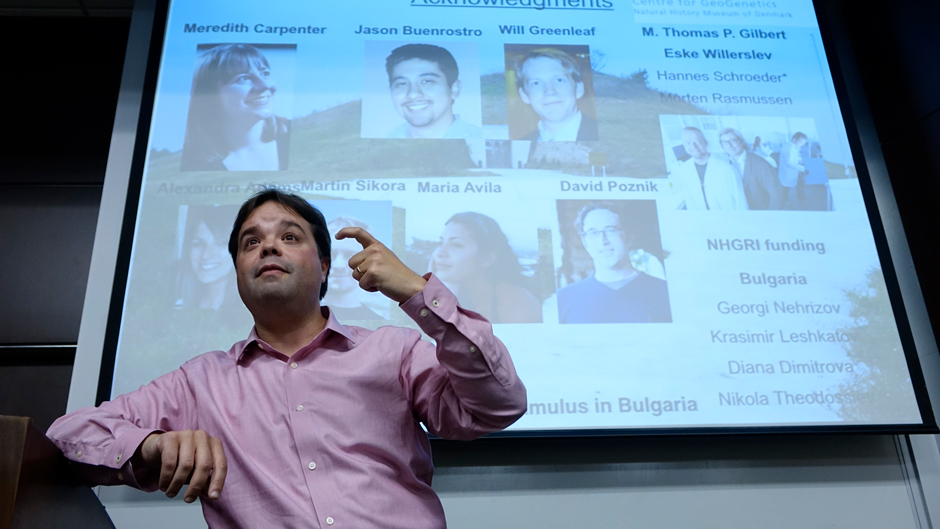“Why should we study DNA?”
Carlos D. Bustamante looked around the room at the University of Miami’s Whitten Learning Center and provided the answer.
DNA, or deoxyribonucleic acid, he explained, lets researchers reconstruct and understand the evolutionary history of our species and ancient genomes, or genetic material.
DNA, he said, provides the crystal ball that provides a clear roadmap to where someone is from. With that information, people can learn about their personal genetic history.
Bustamante, the University of Miami’s latest visiting talent and Presidential Distinguished Scholar, is a Harvard-educated population geneticist whose research not only focuses on genomics technology and its application in medicine, agriculture and evolutionary biology but on empowering policymakers to use the field of genomics and data science to improve human health and well-being.
In his lecture Monday evening, entitled “Are We All Neanderthals? Population Genetics, Ancient DNA, and the Great Human Diasporas,” Bustamante said that nearly 95 percent of genetic studies are done on groups of European descent. He added that researchers need a more diverse sampling of fully sequenced human genomes and exomes to better trace more groups of people and go further back in the study of the history of mankind.
Bustamante also touched upon the human-Neanderthal split. The Neanderthal Y Chromosome has not been detected in any living person, suggesting that the lineage is likely to be extinct. He posited that antigens from certain Neanderthal genes are thought to elicit a maternal immune response in humans during the gestational period, leading to incompatibilities that left Neanderthals and humans unable to breed.
However, he is hopeful that more answers will be found in new discoveries through genetic sequencing.
“We have every reason to believe there are additional species in Africa to be found by sequencing people, not fossils,” Bustamante said. “DNA will allow us to build out the family tree of humanity.”
Bustamante is the founding chair and professor of the Department of Biomedical Data Science and professor of genetics and biology at Stanford University School of Medicine. He received a B.A. (1997), M.A. (2001), and Ph.D. (2001) from Harvard University. He was a postdoctoral fellow at the University of Oxford (2001–2002). His scientific articles have appeared in such journals as Nature, Science, Molecular Biology and Evolution, PLoS Genetics, and PNAS.
Bustamante is also founding director of the Stanford Center for Computational, Evolutionary, and Human Genomics, and focuses on reducing health disparities in genomics by broadening representation of understudied groups.
As part of his tenure as a UM Distinguished Presidential Scholar, Bustamante is presenting lectures at a number of schools and colleges at UM in April.
His talks included, “Bringing Down Health Care Costs by Genetic Study and Use of Big Data,” “Genomics and the Law: Promises, Pitfalls, and Potential Solutions,” “Ethics for Lunch,” “Genomics for the World: Application of Next Generation Sequencing in Diverse Populations and Methods for Evaluating the Pathogenicity of Variants,” and “Barnyard Genomics: A Dog and Pony Show—Using Genomics to Improve Overall Canine and Equine Health, Performance, and Genetics.

